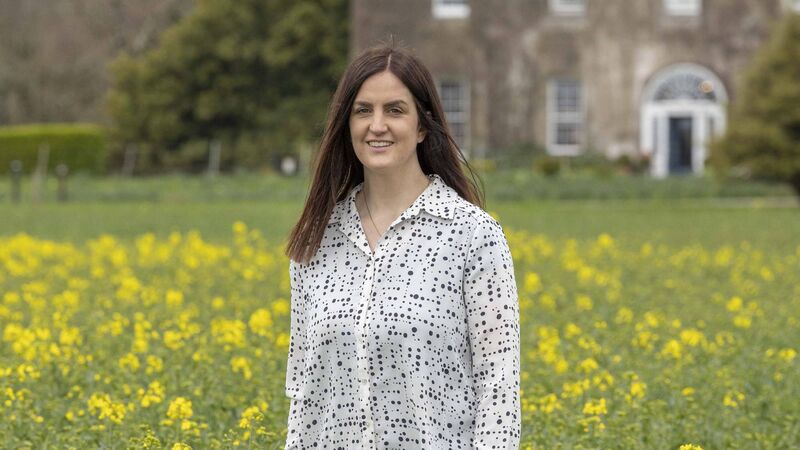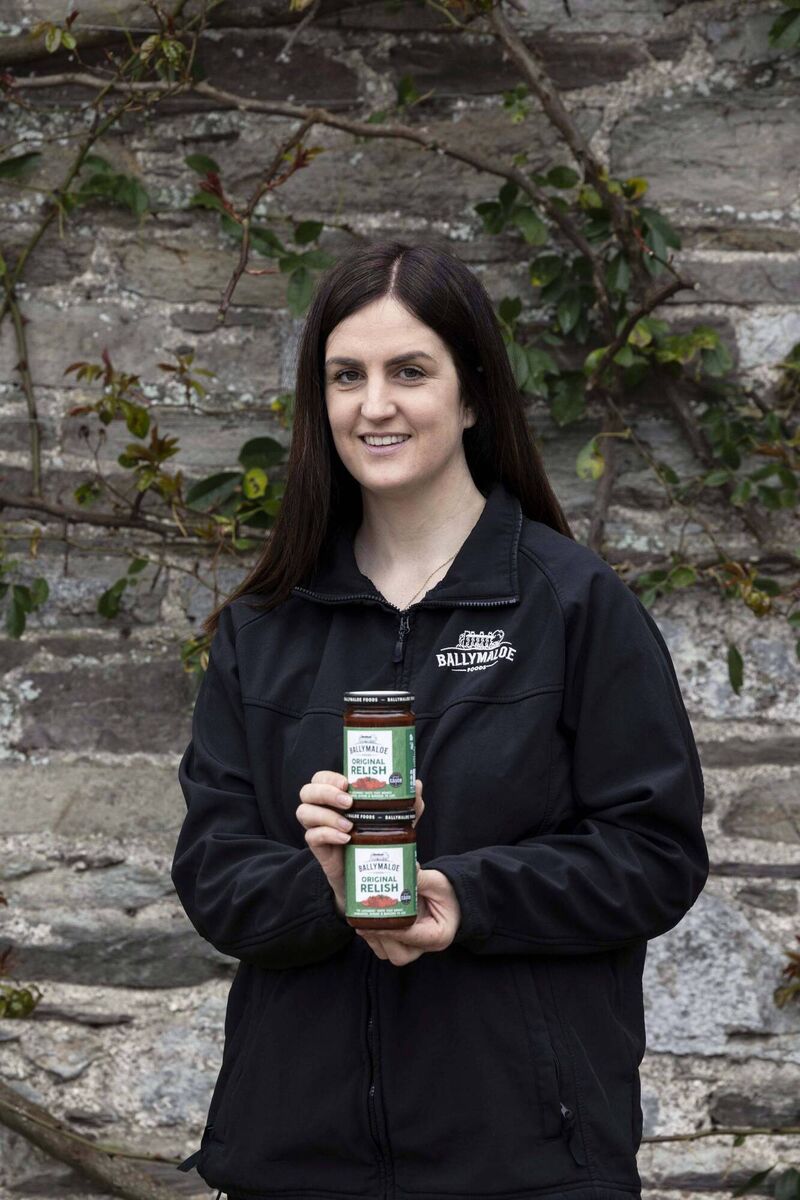Meet the Cork woman growing one of Ireland’s iconic food brands

Maxine Hyde Ballymaloe Foods. Pictures: Clare Keogh
WHEN Ivan Allen grew the tomatoes that his wife, Myrtle Allen, made into a relish and served to guests at Ballymaloe House, could they have known that same relish would become famous around the world?
Myrtle and Ivan’s daughter, Yasmin, had a sharp eye. Recognising the popularity of that singular relish, she took the recipe and with it launched Ballymaloe Foods in 1990.
Thirty-three years on, at 68, Yasmin is still active in the business – she still mixes together the spice blend inside every jar of Ballymaloe Relish. Day to day operations are headed up by her daughter – the third generation – Maxine Hyde, General Manager, alongside her brother, Sean, sister, Rose, and sister-in-law, Linda.
It couldn’t be more of a family business if it stuck itself on an ancestry plan shouting, ‘Hey, I’m a Family Business!’ What started with one woman and one product has expanded to a company that employs 40 people, producing a range encompassing chutneys, relishes, sauces, pickles, ketchups, Bolognese sauces and seasonal specials.
I arrive at Ballymaloe Foods headquarters and immediately am offered a cup of tea. As if to emphasise the company’s genesis, tea arrives on a tray with a proper tea pot, milk in a jug, a sugar pot, brown bread, cheese, and a jar of relish.
Maxine refers to their famous relish as ‘The Original Hit’. Her mother started the company when she was just four years; she has literally grown up around the business, but still dives into the relish as happily as I do.
“We got a portable building in the back garden, and that’s where the relish was made for the next five years. There were four kids, and we were all helping; everything was done by hand. I always had interest in the business side of it; I loved going to shows, seeing the introduction of the product and the selling of it.
If I’m honest, I never considered any other career than to go on and help my mum in the business.
Maxine didn’t plan to go into the business straight from college; she took a year off before her studies to work as a chef in the Crawford Art Gallery café. But there was always something that needed doing in her mum’s business: a logo, a proper website, on hand to check emails while Yasmin got on with the busy work of making her condiments.

“I was entrenched in several projects and as soon as I finished college, I could complete them. Then I was in, and it was very hard to leave - but I should have, and I’d say that to any child of food businesspeople. Go away off for ten years and then come back!”
Maxine found her niche in sales and marketing. There was no-one doing that on a full-time basis, and as a one-member team, she was attending every meeting and event by herself.
“We slowly started building our teams six years ago and now we have great sales, marketing and finance teams. We employ 40 people permanently, and then seasonal temps – especially for beetroot week and Christmas packing.”
Today is bang in the middle of beetroot week. On a walk through the production area with Maxine after, the whole area is festooned in deep purple. The beetroot is Irish, and Ballymaloe Foods work directly with the farmer to produce the beets that go into their jarred pickled beetroot.
“My mum always says we buy local, buy Irish, then UK and Europe. There are certain things like spices that come from afar, and Ireland’s lost a good few industries since my mum set up: the sugar industry, vinegar used to be made in Dublin and glass used to be made in Ireland. We’re importing those now, unfortunately.”
The beetroot has been exciting for us because we went straight to the farmer – he grows it, we give him a good price and we work in co-ordination with him. Last season was a bounty harvest, so we tried to make more.
The idea for the beetroot product was Yasmin’s, who saw a gap in the marketplace for a beetroot condiment made from Irish grown vegetables. It is now one of their biggest sellers and helps to support a farmer in Ireland’s under siege horticulture sector. The Ballymaloe Foods team are trying to make the same impact now with Irish-grown red onions for their Red Onion Relish.
“It’s exciting because we’ll try to do with that what we did with the beetroot,” says Maxine, who clearly sees the importance of creating a route to market for Irish-grown vegetables.
“We have to import tomatoes, but tomato crops are failing because of climate change. Every year for five years now Spain has had drought, it’s scary. If we can move to Irish-grown onions and beetroot and be less reliant on imported tomatoes, that would be good. There’s a lot we have to import, but root veg shouldn’t be one of them.”
As the third generation in the business, and also custodian of Myrtle’s original recipe, Maxine’s responsibilities are of a different shape to her mother and grandmother. When Myrtle made the relish, she was driven by her need to use up something that was a glut. Yasmin took that and turned it into a business to establish that product in a busy marketplace. For Maxine, it’s about keeping the business growing and sustainable.
“On September 20, 2019, we had a fire here at the factory. I was late to work because we had just finished three days at the ploughing, so we all came in a little bit late.
"I woke up to messages and texts on my phone that there had been a fire. I drove down and all our employees were standing on the side of the road, three fire brigades here, and everyone just stood looking.
That was when it hit me: I’m an employer, and people’s wages, family life, mortgages, is all part of what we do. So, when I’m going through a tough time and asking what’s it all for, I remind myself we’re giving decent sustainable employment for people.
Ballymaloe Foods is popular beyond Irish shores, too.
“There are five export markets we focus on: UK, The Netherlands, and Germany; Spain and France, but only for food service there. We also sell into Canada, Australia, USA and Dubai – Irish people living in those countries.”
As part of that expansion, it was important to Maxine to distil the company’s values towards its employees: Warmth, High Standards, and Dedication.
“We developed these values with our staff and family working in the [Ballymaloe] businesses. We did sessions with everyone on the three values and what activities in the business they see align to them. We then collated the most reoccurring ones. What we find now is that if someone isn’t enjoying it here, there’s probably a value misalignment somewhere.
It’s hard when you grow, but we have them up everywhere, we bring everyone through it - we try.
Ballymaloe Foods is not just growing in new territories, but also by acquiring another small food brand that aligned well with the values and commitment to using best possible quality ingredients. In 2022, Ballymaloe Foods acquired the Mama Bear brand created by Glanmire-based businesswoman, Loretta Kennedy.
“Loretta sent me an email asking if we’d be interested in buying her company. It piqued our interest; it’s a lovely brand, and myself, my brother, sister, and sister-in-law have all entered parenthood in the last six years. The Mama Bear concept of feeding your children well appealed to us, so we thought, why not branch out into another brand?”
The Ballymaloe ethos has always been about using the best possible ingredients; the kind of real ingredients found in our kitchens. The process of making it follows suit: yes, these are products made in a factory setting but, says Maxine, made in a way that’s close as possible to home cooking.
In one part of the production area, giant steel cooking pots line the wall complete with lids and a spindle that keeps the cooking mixture moving. An employee tips one pot forward, and out comes what Maxine says is the pickling liquor for the beetroots. Soon, the famous relish is cooking away filling the air with a heady mix of tomatoes, spice and sweet vinegar.
My mum designed these pots because they mimic stove-top cooking. It’s expensive, we could be making it in a cheaper way, but it’s how we believe we can maintain the flavour.
“Sometimes, you see a price comparison review usually comparing products that aren’t using good quality Irish produce. It’s hard when you see articles saying buy an own-brand relish because it’s €2 cheaper, but we stick to our values.”
Any food business will tell you it’s been a tough trading year of increasing costs in a cost-of-living crisis, but there is plenty of reason for optimism at Ballymaloe Food – one of which is Christmas!
“Soon, we will be launching our range of Christmas condiments: a Truffle Mayonnaise, Cranberry and Vodka Sauce and, for the first time ever, a Christmas-themed jar of our classic Ballymaloe Relish. We’ll also be working on growing Ballymaloe Relish in the UK.
“We’re now in 800 Tesco stores, up from 320 last year. UK consumers love the relish, so we see great potential there.”
Ballymaloe Foods also gained an Origin Green Gold Award from Bord Bia. Sustainability has never been more important in the food industry, says Maxine, and a doubling down on efforts to reduce waste and water usage, recycling and finding lower carbon packaging solutions are all on the horizon.
It’s all in a day’s work for Maxine. Having learned how to do everything in the family business, including getting stuck into cleaning on the factory floor, a busy mum, and growing one of Ireland’s iconic food brands, what words of wisdom would she give for women coming into the food industry?
“Give it your all at the start of your career. We always say to [intern] students they’ll get back what they put in.
Those that try hard, are helpful, energetic and passionate, we give it back to them in spades.
“Most of all, work for businesses and managers that align with your values."







 App?
App?


